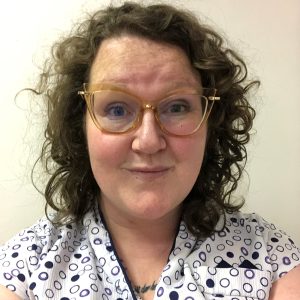
Rachel Lowe, a peer supporter at Cumbria, Northumberland, Tyne and Wear NHS Foundation Trust, a provider of mental health and disability services (CNTW), is waiting for a formal diagnosis of ADHD.
To mark Neurodiversity Celebration Week 2023, Rachel is sharing her experience of realising she might have ADHD.
A couple of years ago I started receiving treatment for Borderline Personality Disorder. The practitioners facilitating my treatment kept mentioning that I might have ADHD.
When I started finding out more about ADHD, everything I read was literally like reading about myself – I’m forgetful and struggle with both organisation and concentration.
Time management can be a challenge. For example, if I need to take a twenty-minute bus journey to arrive somewhere at 7pm, I would leave my house at 6:40pm without factoring in the likelihood of traffic or the time it takes to walk to the bus stop and find my way once I get off the bus. I have to try hard to make sure I’m on time.
These are things other people find easy and I’d always assumed finding them difficult was just part of my personality.
I’d advise someone who thinks they might have ADHD to ask friends and what they see as it can be hard to notice things when thinking about your own behaviour.
When I first spoke to my parents about ADHD, they said ‘isn’t that what naughty boys have?’ but the more they found out about it, the more they understood that I might have ADHD.
My mum remembers things like sending me to the shop for bread when I was younger and me returning with everything but the bread. At the time, my mum thought I was just misbehaving but I had already forgotten about the bread when I arrived at the shop and focused on buying other things that I thought we needed instead.
It’s also helpful to look back on your own experiences and think about things you might not have noticed before. I remember my ex-partner getting so annoyed about me leaving all the cupboard doors open after I’d been looking for something. As soon as I found what I was looking for I’d forget about tidying up afterwards. I now recognise this as the focus and forgetfulness associated with ADHD.
As an adult, it can be hard to tell people you have ADHD without an official diagnosis but being honest with friends, family and colleagues can help. For example, I can ask colleagues to remind about meetings or follow up on verbal instructions with an email.
This Neurodiversity Celebration Week, I want to tell people that I don’t find ADHD to be a disorder, as I think it comes with lots of benefits, being creative and being able to approach issues from a variety of different angles.
This Neurodiversity Celebration Week, I want to tell people that I don’t find ADHD to be a disorder, as I think it comes with lots of benefits, being creative and being able to approach issues from a variety of different angles. So many projects I initiate come from seeing gaps in the status quo.
Find out more about neurodiversity on the Neurodiversity Celebration Week website.
If you think you might have ADHD, your GP or another health professional can refer you for an assessment by the Adult ADHD Service.
